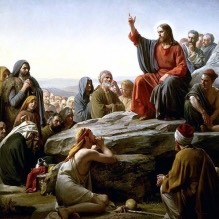In Luke 16:19-31, Jesus tells a parable that has led to a lot of controversy. Some people believe that the teaching—a story about a rich man and a beggar who die and go to hell and heaven—is to be taken literally, and gives proof that God’s people go to heaven immediately after they die.
However, others show us that the language and setting of the story are figurative. Most scenes in the parable contradict the teachings of Scriptures, indicating that Jesus was telling the story to convey a larger truth.
The Context
Throughout history, God had named the Israelite people His own. The nation had been highly favored by God as His children, and as the recipients of His truth.
The Jews were called to use the truth God gave them to lead other nations to God. For this reason, God placed them at the crossroads between the great nations and trade routes of that time.
However, instead of fulfilling their mission, the Jews had become self-centered, claiming salvation only for themselves. While priding themselves in their exclusivity, they had nevertheless embraced heathen teachings, including lies regarding the afterlife, but always with the provision that their heritage would get them into heaven.
In His story about Lazarus the beggar, Jesus speaks against the hypocrisy of these views.
The Plot
The story begins with a wounded beggar named Lazarus. He lay everyday at the gate of a rich man, who was too busy dressing himself in purple robes and white linen to show Lazarus any pity.
One day, both men died. Lazarus was taken to heaven where he sat next to Abraham. The rich man, however, was sent to hell where he remained in torment.
Seeing Lazarus in heaven, and still believing himself to be better than the beggar, the rich man concocted a plan. He told Abraham to send Lazarus down to give him a drink.
When Abraham said no, the rich man begged him to at least send Lazarus to warn his family about the torments of hell. But Abraham simply said, “You’ve had the prophets to warn you. Why would your family listen to Lazarus when they ignored the messengers God already sent?”
The Lessons

Jesus told this story as a sharp rebuke to the Jewish religious leaders. In the parable, the rich man represents the Jewish nation, and the poor man represents the Gentiles.
The rich man had the knowledge of the King of kings (purple is the colour of royalty), and the means to attaining righteousness (white linen). But as the parable unfolds, Jesus turns the viewpoint of the Jewish leaders on its head by placing the rich man in "hell" and the poor man in "Abraham's bosom."
Jesus was saying that personal status does not guarantee salvation. He was telling the Jews that they could only find salvation in God’s grace, not their own works or lineage. The Jews claimed Abraham as their father (John 8:39), but in the parable "Father Abraham" was unable to help the rich man.
The New Testament states that those who are in Christ are Abraham's seed (Galatians 3:29), and that Christ came to restore the wounded and brokenhearted. Only those who realize their own spiritual poverty and need for Christ can attain His blessings.
Through this story, Jesus was also revealing to the disciples their new task: to break tradition and preach the Gospel with power to the Jews and the Gentiles alike.
As each scene unfolds in the parable, it conveys a spiritual truth contrary to the mindset of the Jewish leaders. The modern trend of taking this parable literally in order to support the doctrine of hell does great injustice to the intent of the story, and causes us to miss the deeper message it holds.
Conclusion
According to the Bible, death is a state of unconscious sleep. This does not mean that there is no record in heaven of the sleeping saints. God knows our being, our very nature, and when He calls forth the sleeping saints, they rise with imperishable bodies and the characters that they have formed under His guidance.
The Biblical record of death, far from being disturbing, is comforting. Our ancestors are not watching our every mistake and feeling the pain of our wrong choices. They are blissfully unaware of unfolding events as they sleep until the day of the resurrection. If we are strengthened by these Biblical truths, the deceptive power of false teachings and miracles can have no hold over us. We will be better prepared to stand in the last days.
Read more about the Bible and how to study it wisely
Read more about the coming of God's Kingdom

This article is adapted from Truth Matters by Professor Walter J. Veith, an international speaker who has studied Biblical issues in-depth in his quest for truth. His popular series Genesis Conflict brings the debate between Creation and evolution to a new climax as he dissects the arguments with a scientific eye. His highly-acclaimed series Total Onslaught sheds light on the state of the world today as we move to a one-world government and an anticipated apocalypse.